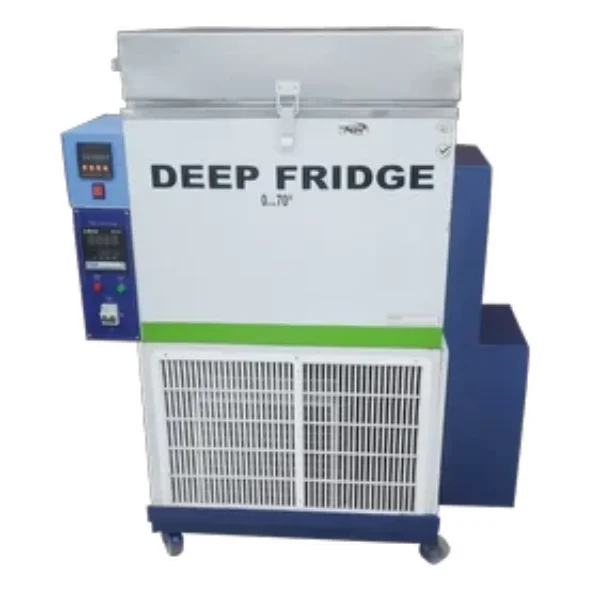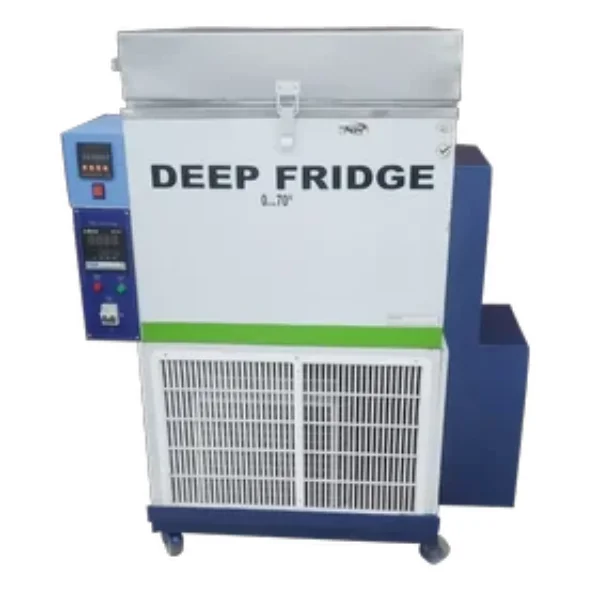
A Deep Freezer used in laboratories is a specialized refrigeration unit designed to maintain extremely low temperatures for the storage of biological samples, chemicals, reagents, and other temperature-sensitive materials. These freezers are crucial in various scientific and medical research applications where maintaining the integrity of stored specimens is essential. Here are key features and aspects of a laboratory deep freezer: Temperature Range: Laboratory deep freezers are capa....
A Deep Freezer used in laboratories is a specialized refrigeration unit designed to maintain extremely low temperatures for the storage of biological samples, chemicals, reagents, and other temperature-sensitive materials. These freezers are crucial in various scientific and medical research applications where maintaining the integrity of stored specimens is essential.
Temperature Range: Laboratory deep freezers are capable of reaching and maintaining ultra-low temperatures, typically ranging from -20°C to as low as -86°C or even lower. Some ultra-low temperature freezers can go down to -150°C.
Storage Capacity: Deep freezers come in various sizes and storage capacities, allowing laboratories to choose a unit that suits their storage needs. The capacity is measured in liters or cubic feet.
Single or Double Compartments: Some deep freezers have a single storage compartment, while others may have double compartments, each with its own temperature control. Double compartments are useful for storing different types of materials at different temperatures within the same unit.
Temperature Control and Display: The freezer includes a temperature control system to set and maintain the desired temperature. Digital displays provide real-time information about the current temperature inside the freezer.
Alarm Systems: To ensure the safety of stored materials, deep freezers are equipped with alarm systems that alert users in case of temperature deviations or power failures. This helps prevent sample degradation due to unexpected temperature changes.
Construction and Insulation: Deep freezers are built with insulation materials to minimize heat transfer. The outer construction is often made of stainless steel, while the inner compartments may have corrosion-resistant materials.
Access Ports: Some models have access ports for external monitoring devices, allowing users to track and record temperature data without opening the freezer door.
Storage Racks and Shelves: Deep freezers are equipped with adjustable storage racks and shelves to organize and maximize storage space for different-sized containers and samples.
Security Features: Some units have locking mechanisms to secure the contents of the freezer, ensuring that only authorized personnel have access.
Energy Efficiency: Energy-efficient models are designed to minimize power consumption, helping laboratories reduce operating costs while maintaining optimal storage conditions.
Compliance with Standards: Deep freezers designed for laboratory use often comply with industry standards and guidelines for the storage of specific materials, such as vaccines, biological samples, or pharmaceuticals.
Laboratory deep freezers play a critical role in preserving the integrity of valuable and sensitive materials used in scientific and medical research. Choosing the right deep freezer depends on the specific storage requirements and applications within a laboratory setting.

Corrosion test chamber is a great laboratory test equipment widely used in metal...
Cyclic Corrosion Salt Spray Chamber manufactured by Sigma Machines – the world...
Sigma Machines CASS tester is designed keeping in mind the relevant tester stand...
Ensure the quality and durability of your materials with our reliable Double Hea...
SIGMA Machines is counted among the best salt spray chamber manufacturers in Ind...
Enhance your testing capabilities with our advanced digital pounding tester...
Enhance your foam testing process with our advanced PU foam Indentation Hardness...
Enhance your yarn quality control with our reliable and efficient yarn strength ...
Get accurate results with our Shear Fatigue Tester for PU Foam...
Ensure precise measurements of soft materials with our reliable thickness gauge...
Enhance your understanding of ball performance using our reliable Ball Resilienc...
Asian Water Absorption Tester is Water Resistance Tester For Sole Leather- (Perm...
Discover the ultimate laundry solution with Laundrometer Digital Model - the per...
Enhance your testing process with Test Template D and achieve accurate and relia...
Ensure the safety of children's toys with our reliable and efficient flammabilit...
The humidity test cabinet provides a sample with the humidity that the materials...
Ensure accurate results with our advanced Bundesmann Apparatus Tester for compre...
A Hot air oven is a great tool for manufacturers to accurately test materials i...
hydrostatic testing equipment used for testing lateral pipes is located within a...
Enhance belt quality control with our Belt Flex Tester, providing accurate and r...
Rockwell Hardness Tester models are suitable for accurately testing the hardness...
Martindale abrasion machine is suitable for testing the pilling degree and abras...
Adhesion Strength Tester serves the purpose of measuring the peelability or perm...
ASIAN Bursting Strength Tester Machine is especially useful for measuring the pa...
Achieve superior strength and resilience with our cutting-edge tensile strength ...
Enhance your quality control processes with our reliable Impact Tester, providin...
Ensure accurate measurements of your drapes' performance with our reliable Drape...
Glow Wire Test Equipment is an important testing equipment which is used in the ...
The heat distortion temperature of the polymer in the test is identified as the ...
Range: 2000 lbs with 1 lbs least count digital display Elongations: Up to 9...
Torque Tester for Bottle Caps is one of the important instruments to calculate t...
The “ASIAN” Universal testing machine provide a relatively inexpensive way...
Asian Melt Flow Index Tester helping evaluate the flow properties of melted plas...
Size of the Test Specimen: 40 X 15 mm Distance between edge of the Crease...
Box Compression Tester is used to measure the box compression strength (BCT), sh...
Enhance your material testing capabilities with the advanced Demattia Flex Teste...
Enhance your understanding of material properties with our Oscillating Disk Rheo...
Enhance your scientific experiments with our Specific Digital Gravity ...
Looking for an accurate and reliable IRHD Rubber Hardness Tester? Look no furthe...
Explore the world of direct reading specific gravity balance through our informa...
Enhance your testing efficiency and accuracy with our state-of-the-art universal...
Discover the Cone Calorimeter Tester: Enhance fire safety with accurate and reli...
Enhance your testing capabilities with a state-of-the-art dry sand abrasion test...
.jpg)
Get In Touch With Us
See How your Business Can benefit With
Sigma Machines
Get Estimated Quote
